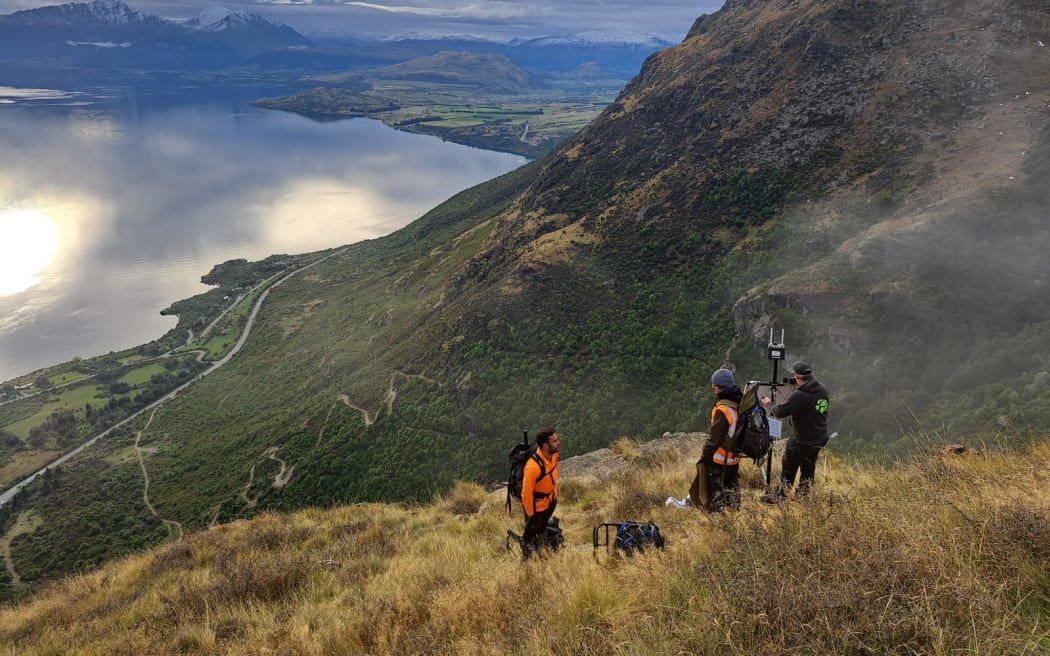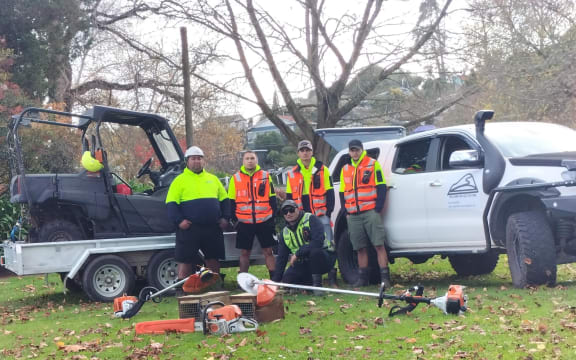They have the newly gained skills, the training and willingness to do one of the country's most vital jobs, but the funding has run out and there's no one to pay for jobs for nature.

The Southern Lakes Sanctuary is one of 500 projects, established with the $1 billion Jobs For Nature funding. Photo: Southern Lakes Sanctuary
A funding bonanza for nature that was seeded during the Covid pandemic is approaching its end date.
In the King Country's ancient Pureora Forest Robert John Muraahi and his small team of pest control workers have been preparing the land for the return of kiwi.
Muraahi has been doing the work as a volunteer for years but with funding from the Covid-19 scheme Jobs for Nature he was able to set up his own business and hire young local people, including unemployed and former prisoners.
The work meant they were returning to the land that their people had lived and worked on for generations.
"They are my success stories, they've come out on top," Muraahi tells The Detail. "All their certificates, all their training certificates that they've achieved in that time are now hanging in their lounges and in frames and stuff, they're very proud of what they've achieved."
But the Jobs for Nature money has run out and without long-term contracts Muraahi is struggling to keep the team together.
It is one of hundreds of pest control, forest restoration and freshwater projects funded by the $1.2 billion Jobs for Nature (J4N) scheme launched in 2020.
"It's empowered us significantly because there were also cultural outcomes. Part of the criteria for jobs for nature was I had to take people with no education background or training history and develop them," says Muraahi.
"We over-achieved in terms of employment outcomes, in terms of our training outcomes and also in terms of our conservation outcomes," he tells The Detail.

In the King Country's ancient Pureora Forest Robert John Muraahi and his small team of pest control workers have been preparing the land for the return of kiwi Photo: Save the Kiwi
The scheme was funded for five years, creating 14,000 jobs, but many projects have ended or are about to finish, leaving workers and the projects themselves facing an uncertain future.
Project leaders have told The Detail they are scrambling to find alternative sources of funding through philanthropists, businesses and communities, but say the lack of forward planning will mean the work on some of the programmes is wasted.
"The minute you stop doing pest control in a forest the re-invasion begins," says David Peters, chair of Project Parore which has been restoring the waterways feeding into Tauranga Harbour since 2008, supported by a $1.75 Jobs for Nature grant.
"Pure volunteerism is not going to get the results we need," he says.
Morgan Cox of Save the Kiwi says it is crunch time for people and projects around the country.
"We've got a lot of skilled people, a lot of good projects up and running. And for that to just hit a wall, to drop off a cliff, would be a great waste. There needs to be a way of bridging this funding through."
Cox is the charity's national coordinator Māori engagement and works closely with small teams, including Muraahi.
He is calling for a fair share funding model that has longevity, with government, councils, iwi, businesses and private funders contributing.
"There's no point in establishing Jobs for Nature, getting people up and running, building this little bit of longevity so you've got good people there gaining skills, getting ready, becoming an efficient business .... and then cut them off. We need a way of ensuring these good starts we've made becoming sustainable in the long run," says Cox.
Chief executive of Predator Free New Zealand Trust, Jessi Morgan says J4N has enabled the predator control sector to take on dozens of apprentices as part of a long-term goal to professionalise the industry. She says 98 percent of the 70-odd apprentices have gained full time work.
"People think setting a rat trap you can learn in five minutes but actually becoming a skilled pest control operator takes time. By the time they've spent two years doing that they're highly valued employees."
Morgan says not all the J4N projects were successful but those that are, should get ongoing funding.
"There won't be employees to do that mahi and so we almost go back to square one for some of those projects," she says.
Rotorua teacher Mark Fisk trained for conservation work at a J4N-funded 12-week cadet programme through Bay Conservation Alliance.
"Today I was doing kokako survey training in Otanewainuku by Tauranga and five of the six of us that were training had been or were currently on the course."
Fisk has not secured full time work in conservation but says the training has bolstered the work of local community groups which are "constantly having to fight for funding".
Project Parore's David Peters says there's a lot of talk about the infrastructure funding in New Zealand and the problems we have with that, "but infrastructure is actually easier than nature. Nature is the infrastructure that supports everything here. All our farming, all our cities, all our water - everything. If you turn the taps on and off with funding, in the long run we'll lose the lot.
"Species that become extinct can't be brought back. Environments, eco-systems that get destroyed, it's very very hard to bring back. At least if a bridge gets cancelled, 10 years, bring some more money in, concrete and steel, that's easy."
The Detail requested an interview with the minister in charge of Jobs for Nature, Andrew Hoggard. A statement sent from the Environment Ministry says the government has made no commitment to extend the programme beyond 2025.
It says a Jobs for Nature Programme Transition Strategy has been published and officials are considering wider options to help promote investment in environmental projects in the future.
Check out how to listen to and follow The Detail here.
You can also stay up-to-date by liking us on Facebook or following us on Twitter.


